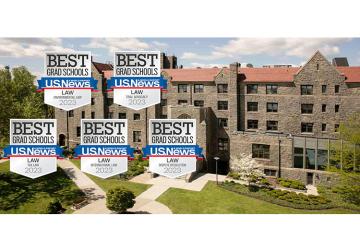The Elisabeth Haub School of Law Ranks #1 in the Nation in Environmental Law

THE ELISABETH HAUB SCHOOL OF LAW AT PACE UNIVERSITY RANKS #1 IN THE NATION IN ENVIRONMENTAL LAW
WHITE PLAINS, NY – Pace University’s Elisabeth Haub School of Law (Haub Law) is ranked number one in the country for environmental law, a signature program at the school, by the latest U.S. News and World Report rankings that were released today.
Today’s news is the latest major success for the program, which has consistently been rated among the strongest in the country. Recently, the environmental law program has recruited top faculty who are recognized scholars in climate change law, international human rights law and natural resources and food systems law.
“At Pace University, we prepare students to change the world,” said Pace President Marvin Krislov. “Our environmental law program, which trains attorneys for this critically important field, has long done world-recognized work. It is fitting that it’s now the top-ranked program in the country. Congratulations to our Law School’s faculty, staff, and students on this much-deserved recognition, and thanks to the Haub family for their commitment to the environment and to the Law School.”
“For the past four decades, our environmental law program has led the way in training environmental defenders and advocates who have gone on to serve in law firms, government agencies and NGOs across the globe,” said Dean Horace Anderson. “We are proud that in our program’s 40th anniversary year, the scholarship of our faculty, the quality of our teaching and the experiential learning opportunities we provide to our students has propelled us to the top of the field.”
The Law School’s newest clinic, the Food and Beverage Law Clinic, was established in 2017 to provide transactional legal services to small- and medium-sized farms, food and beverage entrepreneurs, and nonprofit organizations seeking to improve food systems across the region. These developments are ensuring that Pace’s environmental law program remains top among its peers.
"We are proud of our work training practitioners, advocates and environmental defenders, but humbled by the challenges that lie ahead," said Jason Czarnezki, Kerlin Distinguished Professor of Environmental Law and Associate Dean of Environmental Law Programs. "Our attention is focused on fostering the aggressive reduction of carbon emissions in light of the climate crisis, rebuilding our country's commitment to environmental law, and fighting for environmental, social and economic justice."
The environmental law program is unique in many ways. Notably, Pace Law is only one of two law schools worldwide to be a member of the International Union for the Conservation of Nature (IUCN). The School’s membership allows students to draft memoranda, debate issues and attend meetings, including the World Conservation Congress and U.S. National Committee meetings.
The Law School also has the distinction of being Co-Secretariat to the IUCN Academy of Environmental Law, helping to build environmental legal education capacity and promote the conceptual development of environmental law internationally. Through the UN Diplomacy Practicum, students provide assistance to UN country Missions by attending meetings on behalf of the Missions and by preparing memoranda and/or research papers on a range of issues such as climate change, renewable energy, fisheries protection, and forest management. All of these opportunities provide Haub Law students with the tools they need to be leaders in environmental law.
Haub Law offers more than 40 environmental law courses. Students can research cutting-edge areas of the law through on-campus centers and institutes that focus on various areas of environmental law including the Pace Energy & Climate Center and the Land Use Law Center, and can represent public interest groups as a student practitioner in the Environmental Litigation Clinic. Students can choose from unparalleled opportunities to develop their skills internationally and through on-the-job practical externships. Pace Law also stands out from other top environmental law programs because of its proximity to New York City (less than 40 minutes by train) and Washington, D.C. (less than two hours by air).
Over the past several years, Pace’s environmental law programs have received numerous recognitions and accolades in recognition of its excellence. In May, the program will be given the Hudson Hero Award by Riverkeeper, which works to preserve the environmental, recreational and commercial integrity of the Hudson River.
###
About the Elisabeth Haub School of Law at Pace University: Pace University’s Elisabeth Haub School of Law (Haub Law) offers J.D. and Masters of Law degrees in both Environmental and International Law, as well as a Doctor of Juridical Science (SJD) in Environmental Law. The school, housed on the University’s campus in White Plains, NY, opened its doors in 1976 and has over 8,500 alumni around the world. The school maintains a unique philosophy and approach to legal education that strikes an important balance between practice and theory.
The Elisabeth Haub School of Law at Pace University launched its Environmental Law Program in 1978; it has long been ranked among the world’s leading university programs. Pace’s doctoral graduates teach environmental law at universities around the world. Pace’s J.D. alumni are prominent in environmental law firms, agencies and non-profit organizations across the U.S. and abroad. In 2016, the Law School received a transformational gift from the family of Elisabeth Haub, in recognition of its outstanding environmental law programs. For more information visit http://law.pace.edu.
About Pace University: Pace University has a proud history of preparing its diverse student body for a lifetime of professional success as a result of its unique program that combines rigorous academics and real-world experiences. Pace is ranked the #1 private, four-year college in the nation for upward economic mobility by Harvard University’s Opportunity Insights, evidence of the transformative education the University provides.
From its beginnings as an accounting school in 1906, Pace has grown to three campuses, enrolling 13,000 students in bachelor’s, master’s, and doctoral programs in more than 150 majors and programs, across a range of disciplines: arts, sciences, business, health care, technology, law, education, and more. The university also has one of the most competitive performing arts programs in the country. Pace has a signature, newly renovated campus in New York City, located in the heart of vibrant Lower Manhattan, next to Wall Street and City Hall, and two campuses in Westchester County, New York: a 200-acre picturesque Pleasantville Campus and a Law School in White Plains.



